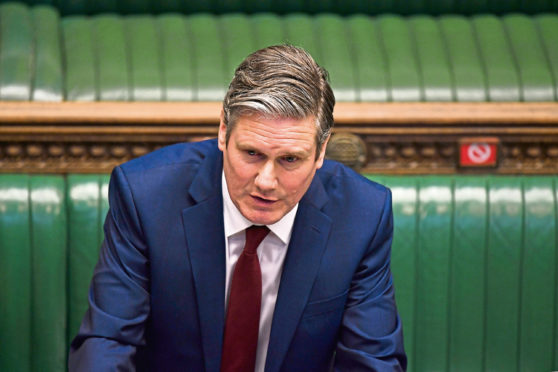Silvio Berlusconi was a sexist, populist buffoon with laughable hair before it was a political trend. Crucially, like those who have followed him, he was successful at the ballot box, too.
He was prime minister of Italy for the best part of a decade from 2001.
The news that he’s contracted Covid-19 puts him back in the public eye.
And it draws attention to the political situation in Italy. Once seen as laughably volatile and in recent years suspected of flirting with a return to fascism. Yet it now looks increasingly like a template for Labour leader Sir Keir Starmer’s route to power.
Those of us of a certain vintage were raised with jokes about the turnover of Italian administrations. They’ve had 70 governments since Mussolini was strung up. The UK has had 30 in the same time span.
Berlusconi seemed to put the lid on that chronic instability. Consequently, he attracted admiring glances from others that fancied they’d altered their nation’s political pattern. Tony Blair famously holidayed at Berlusconi’s mansion and was pictured along with wife Cherie while their host sported a bandana believed to be covering up evidence of a recent hair transplant. Blair always did have a fatal weakness when it came to making friends.
It started with taking £1 million off the then Formula One supremo Bernie Ecclestone, took in Cherie’s new age buddy Carole Caplin, and reached its apogee with his commitment to dimwit president George W Bush. If you judge a man by the company he keeps then Blair comes up short. Alternatively you could judge a man by his domestic policy achievements. Something anathema to the sort of Corbynite spoons surrounding embattled Scottish Labour leader Richard Leonard. Supporters recently accused those looking to depose Leonard as “Blairite”, which is a bit like me insulting a fellow golfer by saying he’s playing like Tiger Woods.
The Italians have long had the approval of Britain’s Brexit crowd. Italy looked most likely to be next out the EU door. Polls consistently show Italians apathetic to the EU. And there’s been a widespread feeling in Italy that the nation is being played when it comes to immigration. Italian islands are the first stop in the EU for many migrants crossing the Mediterranean. Consequently, for a time they found themselves picking up more than their fair share of the bill for dealing with the issue.
But the Brexiteers have been proved wrong about Italy. And this is where Sir Keir Starmer’s interest ought to be piqued.
Berlusconi was finally toppled by the scandal of his “bunga bunga” parties. He’d been indulged as a comic turn with a colourful love life and a penchant for younger women. Remind you of anyone? Turned out his lifestyle was no laughing matter for the women he used.
And he paved the way for something darker. Matteo Salvini became deputy prime minister in 2018 after dominating the political narrative for years before. And he wasted no time in demonising immigrants and threatening a “racial census” of Italians.
The obvious comparison in the UK is with Nigel Farage. Except the sometime radio host can’t actually get elected here. Salvini was also Italian interior minister. With her trips to Dover and incessant tweets trying to demonise lawyers for defending migrants – doing their job – Priti Patel is perhaps more accurately analogous and therefore one to watch among those with ambitious to succeed the current prime minister.
So far so worrying for Westminster. If Boris Johnson is farce then tragedy may follow.
Except that hasn’t happened in Italy. Salvini made his move to step up and become PM a year ago. But the man in post, Guiseppi Conte who was previously regarded as nothing more than a dullard and a technocrat, called him out as a chancer and staved off the challenge.
Covid hit Italy hard at the start of this year. But Conte’s government applied science, took the population with them as they introduced extraordinary lockdown measures and then slowly repealed them. Now the administration is largely respected, perhaps even beloved. Eurosceptic tendencies have ebbed.
When it comes to the crunch it seems folk value competence and togetherness. The nation pulled together against an outside force – not the false enemy of desperate immigrants but the real and present danger of a nasty disease.
People can spot that a bedraggled migrant landing in Lampedusa or stumbling up the beach at Dover is unlikely to harm them. A virus that rips through care homes and has clocked up tens of thousands of deaths is a different matter.
To treat voters as unable to differentiate is to belittle and patronise them. Folk will be dismissive of any administration that seeks to distract from what is obviously the most pressing issue – a threat to livelihood, lifestyle and ultimately life – by pretending a few Syrians in a dinghy or intransigent EU negotiators are of similar magnitude.
We don’t know how far into the coronavirus crisis we are yet. It’s likely we’ll emerge a more serious nation after such trauma. That’s what’s happened in Italy. If the UK follows a similar path, Starmer may find Labour back in with a shout of power sooner than many anticipate.
Berlusconi was the canary in the coal mine when it came to the global takeover of populist bampots, each with their own individual hairdo peccadillo. Sir Keir Starmer and his boring, technocratic, Labour colleagues ought to be watching Italy closely. It may prove again to be the outlier that sets a trend, this time for governments that display competence over performance.
James Millar is a political commentator and author and a former Westminster correspondent for The Sunday Post










